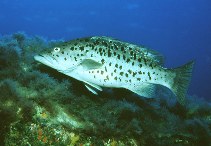| Family: |
Epinephelidae (Groupers) |
| Max. size: |
80 cm TL (male/unsexed); max.weight: 3,000.0 g |
| Environment: |
demersal; marine; depth range 1 - 200 m |
| Distribution: |
Eastern Atlantic: known with certainty only from the Azores, Madeira, Cape Verde, and the Canary Islands. |
| Diagnosis: |
Dorsal spines (total): 11-11; Dorsal soft rays (total): 14-16; Anal spines: 3-3; Anal soft rays: 10-12. Distinguished by the following characteristics: brownish or dark grey body color of adults with irregular pale blotches and spots and prominent maxillary streak (capable of reversing body color pattern when under stress); juveniles mottled greenish brown, with prominent white spots on head and body, median fins with white streaks and hyaline golden pectoral fins; oblong and compressed body, depth 3.0-3.3 times in SL; head length 2.6-2.9 times in SL; convex interorbital area; enlarged serrae of preopercle at the angle, forming rounded lobe below shallow indentation on vertical limb; few small serrae on subopercle and interopercle; subequal sizes of anterior and posterior nostrils in juveniles, adults with 3 times larger posterior nostrils compared to anterior ones; lower jaws extends well in front of upper jaw (Ref. 89707). |
| Biology: |
Adults occur near the bottom in rocky areas; juveniles are found in tide pools (Ref. 89707). Two specimens collected from the Cape Verde by J. Cadenat were from a depth of '50' m (Ref. 27000). Observed to have a homing behaviour leaving the bay of Garajau on the south coast of Madeira Island in spring and returning every year in autumn (Ref. 75147). |
| IUCN Red List Status: |
Vulnerable (VU); Date assessed: 20 November 2016 (B2ab(v)) Ref. (130435)
|
| Threat to humans: |
harmless |
Source and more info: www.fishbase.org. For personal, classroom, and other internal use only. Not for publication.
